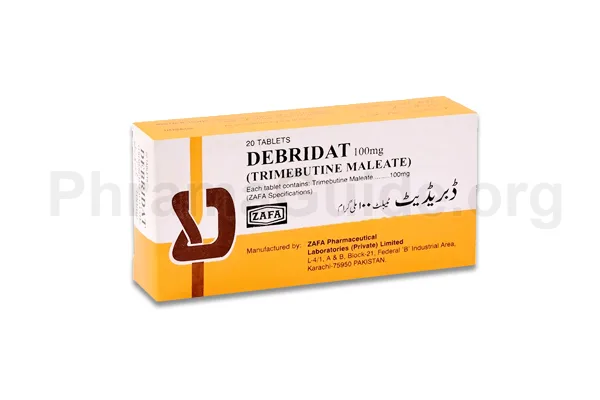Debridat tablet is a medication used primarily for gastrointestinal disorders. It helps regulate the movements of the intestines and may also have some pain-relieving properties. The following are some common uses and indications of Debridat Tablet:
- Functional Gastrointestinal Disorders: Debridat tablet is primarily used in the treatment of functional gastrointestinal disorders, which are conditions where the digestive system looks normal but doesn’t function properly. This includes disorders like irritable bowel syndrome (IBS) and functional dyspepsia.
- Irritable Bowel Syndrome (IBS): Debridat tablet may be prescribed to alleviate symptoms associated with IBS, such as abdominal pain, bloating, constipation, and diarrhea. It helps regulate intestinal motility and reduces symptoms.
- Functional Dyspepsia: Debridat tablet can be used in the treatment of functional dyspepsia, a condition characterized by chronic or recurrent pain or discomfort centered in the upper abdomen.
- Postoperative Gastrointestinal Disorders: It may be used to alleviate gastrointestinal symptoms that arise after surgical procedures, especially those involving the digestive tract.
- Gastrointestinal Spasms and Colic: Using Debridat tablets may help relieve spasms and colic in the gastrointestinal tract.
- Esophageal Motility Disorders: Debridat tablet may be used in the treatment of disorders affecting the movement of the esophagus, which can lead to symptoms like difficulty swallowing and chest pain.
- Colonic Disorders: Debridat tablet may be used in certain colonic disorders to regulate bowel movements and reduce symptoms like abdominal pain and irregular bowel habits.
Off-label Uses of Debridat Tablet
- Functional Abdominal Pain Syndrome: Debridat tablet may be considered for the management of chronic abdominal pain that is not associated with a specific gastrointestinal disorder.
- Non-Ulcer Dyspepsia: In some cases, Debridat tablets may be used to alleviate symptoms of dyspepsia (indigestion) in cases where no underlying cause can be identified.
- Infantile Colic: Some healthcare providers may consider Debridat tablets for the management of infantile colic, a condition characterized by excessive crying and fussiness in infants.
- Gallbladder Disorders: In some cases, Debridat tablets may be considered for the management of symptoms associated with gallbladder disorders, such as biliary dyskinesia.
- Acute Gastroenteritis: Debridat tablet may be considered for its antispasmodic properties in the management of acute gastroenteritis, although this is not a standard treatment.
- Functional Constipation: While Debridat tablet primarily targets gastrointestinal motility, it may be considered off-label in the management of functional constipation.
- Recurrent Abdominal Pain in Children: Debridat tablets may be considered in cases of recurrent abdominal pain in children when no underlying pathology is identified.

What is Debridat?
Debridat is one of the leading brands of Trimebutine maleate, manufactured and marketed by Zafa Pharmaceutical Laboratories (Pvt) Ltd, Pakistan.
Debridat Tablet’s Alternatives : Other Similar Brands
The following are some alternative brands of Debridat and their manufacturers.
- Mebutin : Wilsons Pharmaceuticals, Pakistan.
- Tributine : Raazee Therapeutics (Pvt) Ltd, Pakistan.
Debridat : Available Formulations and Strengths
Presently, Debridat is available in Tablet and Syrup forms.
- Debridat Tablet : 100mg and 200mg strengths.
- Debridat Syrup : 24mg/5ml strength.
Who Should Not Use Debridat? – Contraindications
Debridat tablets have specific contraindications, meaning there are situations or conditions where the medication should not be used.
- Hypersensitivity or Allergy: Individuals with known hypersensitivity or allergy to Trimebutine maleate or any of the inactive ingredients in the Debridat Tablet should not use it.
- Obstructive Disorders of the Gastrointestinal Tract: Debridat tablets may exacerbate conditions where there is an obstruction or narrowing of the gastrointestinal tract, such as bowel obstructions or strictures.
- Severe Ulcerative Colitis: Debridat tablet should not be used in cases of severe ulcerative colitis, a chronic inflammatory bowel disease.
- Toxic Megacolon: This condition involves severe, potentially life-threatening inflammation of the colon. Debridat tablet is contraindicated in cases of toxic megacolon.
- Paralytic Ileus: Debridat tablet is contraindicated in cases of paralytic ileus, which is a condition characterized by a lack of bowel motility.
- Children Under 3 Years Old: Debridat tablet is generally not recommended for use in children under the age of 3.
- Pregnancy and Breastfeeding: The safety of Debridat tablets during pregnancy and breastfeeding has not been well established. The potential risks and benefits should be carefully considered, and the medication should only be used if deemed necessary.
- Severe Hepatic Impairment: It should be used with caution or avoided in individuals with severe hepatic impairment.
- Severe Renal Impairment or End-Stage Renal Disease: Debridat tablet is contraindicated in individuals with severe renal impairment or end-stage renal disease.
What is the Recommended Daily Dosage of Debridat Tablet?
Debridat Tablet Dose for Adults:
- 1 – 2 Tablets of 100mg, 2 to 3 times a day.
- The maximum daily dose is 600 mg. (3 tablets of 200mg)
How Debridat Works?
Debridat tablet works by acting on the smooth muscle of the intestine to modulate its contractions.
Debridat tablet has a dual mechanism of action. It can both increase and decrease the contractions of the intestine, depending on the current state of the intestine. At lower concentrations, Debridat tablet increases the contractions of the intestine, which can help to relieve constipation. At higher concentrations, Debridat tablet decreases the contractions of the intestine, which can help to relieve diarrhea.
Debridat tablet is thought to work by acting on the opioid receptors in the intestine. Opioid receptors are proteins that are found on the surface of cells throughout the body. They are activated by opioid molecules, such as morphine and codeine. When opioid receptors are activated, they send signals to the brain that inhibit pain and other functions.

Leave A Comment